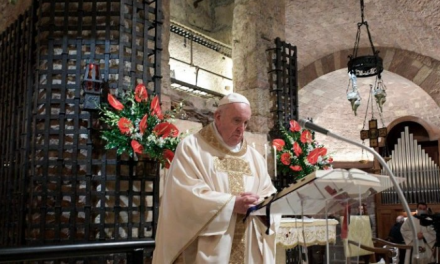Concern for the environment is often portrayed as a “luxury” issue, a bourgeois issue, compared to concern for the poor. Economists often suggest that care for the environment and “reducing pollution” is a luxury that becomes more attractive with wealth and development. So it is noteworthy that Pope Francis, who is of and for the poor, made the protection of creation central to his inaugural homily.
The vocation of being a “protector”… means protecting all creation, the beauty of the created world, as the Book of Genesis tells us and as Saint Francis of Assisi showed us. It means respecting each of God’s creatures and respecting the environment in which we live. It means protecting people, showing loving concern for each and every person, especially children, the elderly, those in need, who are often the last we think about. It means caring for one another in our families: husbands and wives first protect one another, and then, as parents, they care for their children, and children themselves, in time, protect their parents. It means building sincere friendships in which we protect one another in trust, respect, and goodness. In the end, everything has been entrusted to our protection, and all of us are responsible for it. Be protectors of God’s gifts! … Please, I would like to ask all those who have positions of responsibility in economic, political and social life, and all men and women of goodwill: let us be “protectors” of creation, protectors of God’s plan inscribed in nature, protectors of one another and of the environment. Let us not allow omens of destruction and death to accompany the advance of this world!
It is fundamentally mistaken to put environmental and economic justice at odds for three key reasons. First, theologically, we cannot believe that God commands us to wreak havoc on creation in order to fulfill the mandate to serve the poor. Such a misunderstanding ultimately creates a dualism of nature and grace, creation and redemption, which Catholicism has always rejected. For example, it is difficult to see how widespread adoption of GMO crops is compatible with Benedict’s insistance that we “work with the grammar of creation.” GMO’s are often said to be needed in order to “feed the world.” But this claim distracts from the fact that we currently have enough food to feed the world, but we choose to divert much of it to feed animals or supplement our fossil-fuel addiction. Ultimately, feeding the hungry and protecting creation cannot be at odds, except if we leave unexamined other issues where we are in need of conversion.
Second, the notion of solidarity is concretely instantiated when we realize that we all suffer in the longer run if we don’t use natural resources – and especially shared resources like the atmosphere and the oceans – sustainably. No doubt in such a scenario, the poor will suffer much more, since the rich will find ways to hoard whatever resources are available and protect themselves (as much as they can) from damage. But solidarity really does mean that it is short-term thinking to sacrifice sustainability for an “economic boost.” The proper pattern of development is well-explained in the US bishops’ 2001 statement on climate change:
All nations share the responsibility to address the problem of global climate change. But historically the industrial economies have been responsible for the highest emissions of greenhouse gases that scientists suggest are causing the warming trend. Also, significant wealth, technological sophistication, and entrepreneurial creativity give these nations a greater capacity to find useful responses to this problem. To avoid greater impact, energy resource adjustments must be made both in the policies of richer countries and in the development paths of poorer ones. … Many of the poor in these countries live in degrading and desperate situations that often lead them to adopt environmentally harmful agricultural and industrial practices. In many cases, the heavy debt burdens, lack of trade opportunities, and economic inequities in the global market add to the environmental strains of the poorer countries. Developing countries have a right to economic development that can help lift people out of dire poverty. Wealthier industrialized nations have the resources, know-how, and entrepreneurship to produce more efficient cars and cleaner industries. These countries need to share these emerging technologies with the less-developed countries and assume more of the financial responsibility that would enable poorer countries to afford them.
Or, as the Catholic Climate Covenant puts it more succinctly, who’s under your carbon footprint? Who will actually be impacted by environmental destruction? In one sense, the answer in inevitably all of us. And in another, the answer is the poor will suffer. On both counts, we need to see that we are all in this together.
Finally, economically, it is a kind of mirage to believe that somehow we will achieve development for billions around the world without fundamental changes in what “development” looks like. Today, China suffers from enormous pollution problems – according to this report from the World Bank, their pollution “costs” amount to 5.8% of their GDP. Air and water pollution are at levels that are far beyond what we would tolerate. Sadly, much of this environmental damage is due to our appetite for their goods – China runs a trade deficit in the aggregate with all other countries, but more than makes up for it with a trade surplus in goods of over $300 billion with the U.S. And when China develops, where will they “outsource” their pollution? Moreover, if the Chinese drive like Americans do, it is “game over” for the atmosphere and (we should add) time for some pretty hefty price spikes in oil. Even at the micro level, our care-less use of technology neglects the labor that could be used doing more care-full jobs.
In what is turning into a characteristic of his style, Francis refuses the dichotomy between structural problems and interior virtue and vice:
But to be “protectors”, we also have to keep watch over ourselves! Let us not forget that hatred, envy and pride defile our lives! Being protectors, then, also means keeping watch over our emotions, over our hearts, because they are the seat of good and evil intentions: intentions that build up and tear down!
Ultimately, we should see the unity of environmental and economic care, because both should proceed from a sense of gift and wonder. Francis challenges us (as did Benedict) to recognize that neglect of the poor and environmental destruction proceed from vice, from the desires that drive our lifestyles. Benedict wrote in Caritas in Veritate:
The way humanity treats the environment influences the way it treats itself, and vice versa. This invites contemporary society to a serious review of its life-style, which, in many parts of the world, is prone to hedonism and consumerism, regardless of their harmful consequences. What is needed is an effective shift in mentality which can lead to the adoption of new life-styles…
Justice calls us back to see the board in our own eyes. One of the ways we evade the connection between environment and economics is to believe that somehow “evil” (on both issues) proceeds from some mega-greedy evil empire of financiers and oil barons. This is the Darth Vader approach to the problem. Unfortunately, as Wendell Berry once wrote, “there are not enough rich and powerful people to consume the whole world; for that, the rich and powerful need the help of countless ordinary people.” Berry asks us to examine what “proxies” we issue in our ordinary lives to other to license their misuse of creation.
Let us not be trapped by false dichotomies of concern for the poor and concern for the earth, dichotomies that often deflect needed change in our own lifestyles. For example, carbon taxation is often opposed by advocates for the poor, on the basis that it will fall hardest on them. But most carbon taxation schemes, including the recent proposal by Henry Waxman, involve some kind of rebate or return proposal. Perhaps the most important thing to do would be to enhance real public transportation options and require Section 8 eligible housing to meet a high standard of insulation. The details here are prudential, but the fundamental commitment is not.




